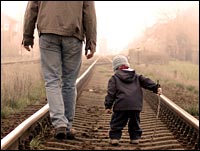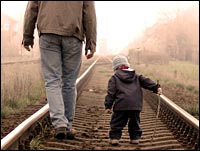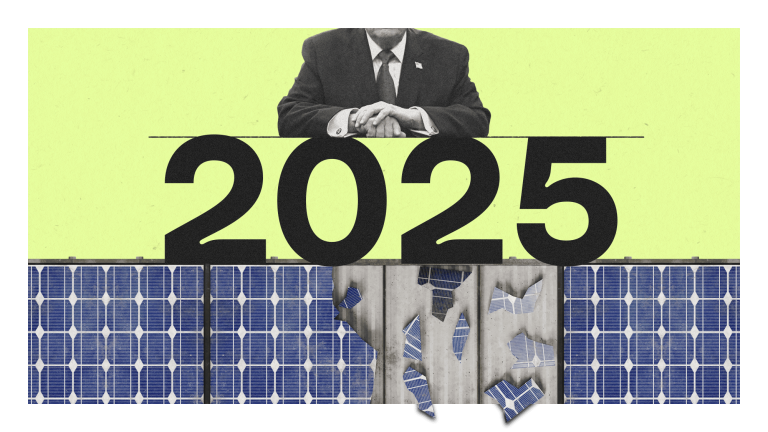When my husband and I moved back to Montana three years ago, I fantasized about living far from town. We’d settle outside the city boundaries, where the Milky Way sparkles clear as a river and red-tailed hawks bank over bunchgrass meadows. My (imaginary) dogs could run over our five acres, frolicking in the ponderosa pines.
That was the plan. But we didn’t do it. And it’s my father’s fault.

He kept me on track.
Photo: iStockphoto.
Before he retired a few years ago, my father spent more than 30 years as an electrical engineer for Bay Area Rapid Transit, the rail system in and around San Francisco. Besides his hard hat resting on the dryer and his stories about venturing into the tunnel under San Francisco Bay, the details of what he did remained vague. Like most children, I was too invested in playground dramas to track adult concerns. But one offshoot of his work was unmistakable: We never drove anywhere.
At my father’s insistence, we took the train to the Oakland Coliseum to watch the A’s play baseball and the bus to Lake Anza in Tilden Park. We walked to school, to the vegetable market, to the public library. Invariably, my father would declare our destination only a little farther. Just as invariably, his “just down the block” translated into several more miles. My sister and I, struggling to keep up in slick-soled flats, would arrive disheveled and sweaty, sorry we ever campaigned to go to this playground or that concert.
Family vacations were thinly disguised tours of the nation’s rail systems. In Boston, we saw the Public Gardens featured in Make Way for Ducklings, but my father made sure we also explored several branches of the T. In Washington, D.C., the cavernous Lincoln Memorial radiated majesty — but was it any more glorious than the even more cavernous Metro? And no memory of my first trip to New York City is as strong as the roaring, graffitoed dragon of the subway.
The moment I got my driver’s license, I drove as often as I could: to school, to the city with a backseat full of friends, to the beach, to the grocery store on the flimsiest excuse. But then, when I got older and moved away, I began to miss all the walking and waiting for the train. When I landed in Seattle after college, it seemed strange, and then downright outrageous, that you couldn’t take the train to the ballpark, that part of the experience wasn’t smashing up against all the other fans in their regalia, shouting curses against the Yankees.
I began organizing my job search by the best commutes. Driving lost its allure, replaced by the charm of mapping neighborhoods by foot and bicycle. Every time I visited a new city, my first task was to track down a map of public transportation routes — that explosion of colorful lines charting freedom and potential.
So when I arrived in Montana and confronted my out-of-town dreams — thought about needing to drive to get a cup of coffee or pick up a loaf of bread or go to the university to do research — my heart started to race. The idea of spending all that time in a car made little fingers of panic creep along my neck. My father’s worldview, it turns out, had seeped into bones and muscles, tapped into my autonomic nervous system, worked its way in as deep as it could go.
I’ve never heard my father describe himself as an environmentalist. Hiking the endless blocks both then and now, he’d never lecture on the importance of conserving gasoline. Mostly, he’d talk about math and chemistry, happy to have a captive audience for his discussions of imaginary numbers (on a trip to the drugstore when I was in sixth grade) or the workings of surfactants (on a walk to the BART station when I visited last month).
But nothing that I’ve read since I was a child, no late-night discussions, no lecture by an eminent biologist or activist has had the same effect. A book or article laying out a graceful argument for avoiding meat from factory farms or creating a compost bin might spur a week-long transformation. But at root, my sole environmental virtue springs not from logic or good intentions. It comes from him.
Now that I have children of my own, I think about how my husband and I can lay the same type of groundwork. My twins are 2 — too young, experts say, for memory. What are we building into them as we take them to the river and point out osprey, or let them water the tomato plants?
The neighborhood where we live now, in Missoula, used to be the edge of town. The realtor described it, perhaps too bluntly, as “equally far from everywhere.” I do drive sometimes: when it’s 20 below, or when I’m ferrying the gallons of milk my kids drink each week, or when we want to see the Milky Way. But we are also a 10-minute stroll from both the farm — where the twins are known as the “apricot kids” because they can go through a three-pound bag in five minutes — and the tattoo parlor, where, thankfully, they do not yet have pet names. The sidewalks are crumbling, weed-infested, often missing, but we can walk to the minor-league baseball park, the organic food palace, or the mall.
And when the children are a little older? The farmer’s market and the library and the bookstore downtown are less than two miles away. Really, just down the block.



